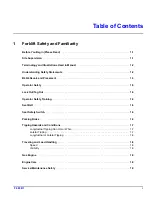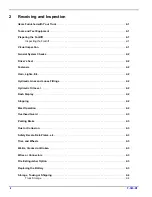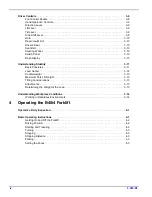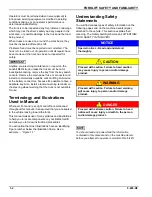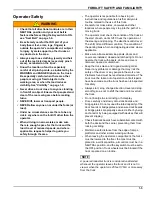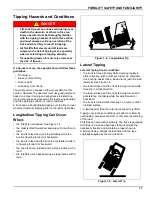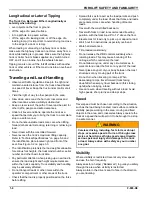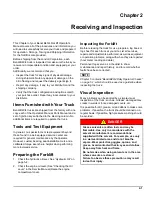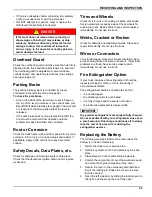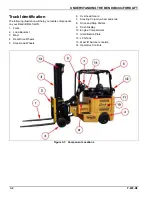
1-8
F-808-R0
FORKLIFT SAFETY AND FAMILIARITY
Longitudinal or Lateral Tipping
The Truck Can Be tipped Either Longitudinally or
Laterally when driving:
• over objects on the floor or ground.
• off the edge of a paved surface.
• into a pothole in a paved surface.
• off the edge of a loading dock, or off the edge of a
loading ramp. (It is important to avoid driving too close
to the edge of a dock or ramp).
When loading or unloading a highway truck or trailer,
make sure the highway truck can not move away from a
dock while loading is in process. Make sure the highway
truck or trailer has its brakes applied, key switch turned
OFF, and if on an incline, has the wheels blocked.
Tipping can also occur if the forklift collides with another
truck or other vehicle, or if the mast runs into an overhead
obstruction.
Traveling and Load Handling
• Observe all traffic regulations. Keep to the right and
maintain a safe distance from the truck ahead based
on speed of travel. Keep the truck under control at all
times.
• Yield the right of way to other people in the area.
• Slow down and sound the horn at cross aisles and
other locations where visibility is obstructed.
• Keep a clear view of the path of travel and be alert for
other traffic, people and safe clearances.
• Under all travel conditions, operate the truck at a
speed that permits you to bring the truck to a complete
stop in a safe manner.
• Do not handle unstable loads. Use care when tilting
forward or backward, stacking, returning or retrieving a
load.
• Never travel with the mast tilted forward.
• Never exceed the truck’s maximum lifting capacity.
Refer to “Technical Specifications” on page 5-9 and
the identification plate located right and front of the
seat. See Figure 3-2 on page 3-3.
• The Identification plate lists the load weights allowable
for various fork heights, the truck model number, serial
number and other basic truck data.
• Pay particular attention when picking up a new load to
ensure the load weight and height requirements are
within the truck’s capacity. Truck stability and handling
may be adversely affected.
• Do not transport loads or other items within the
operator’s compartment or other areas of the truck.
• Check that the load is properly positioned on the forks
before lifting.
• Spread forks as far apart as the load permits and push
completely under the load. Check that forks and loads
are centered. Use care when handling off-center
loads.
• Travel with the mast tilted backward.
• Travel with forks or load in recommended traveling
position, with the forks/load 8” to 12” above the floor.
• Elevate mast or load only to pick up or deposit a load.
• Watch out for obstructions, especially overhead.
• Watch all clearances.
• Tilt a loaded mast slowly.
• Do not release the lift/tilt controls suddenly when
lowering loads. This may cause bouncing of the
carriage, which could dump the load.
• Do not allow anyone, under any circumstances, to
walk or stand under the forks or any part of the load.
• Never place any part of your body between the mast
structures or any moving part of the truck.
• Do not turn when traveling on ramps. When
descending ramps, travel forward (forks facing
downhill) when empty, travel backward (forks facing
uphill) when carrying a load.
• Use care even when traveling without a load. Avoid
high speeds, sharp turns and abrupt stops.
Speed
Travel speed must be chosen according to the situation,
such as the load being handled, road surface conditions,
visibility, people working in the area, moving and fixed
objects in the area, and cross aisles.Always operate the
truck at a speed that will permit it to be brought to a stop
in a safe manner.
WARNING
Visibility
Where visibility is restricted, travel at very slow speed
and use the horn frequently.
Always ask for a helper (“Banksman”) to guide you safely
through the area when visibility is restricted.
Always rotate in the driver’s seat to face in the direction
you are traveling.
Careless driving, including, fast starts or abrupt
stops, excessive speed at turns or through cross
aisles or hard turns at high speeds can all lead to
serious personal injury and damage to the truck
or load. Always drive with safety as your number
one goal.
Summary of Contents for Bendi B40i4
Page 2: ......
Page 12: ...1 4 F 808 R0 FORKLIFT SAFETY AND FAMILIARITY Figure 1 2 Decals...
Page 18: ...1 10 F 808 R0 FORKLIFT SAFETY AND FAMILIARITY Table provided for general use NOTES...
Page 24: ...2 6 F 808 R0 RECEIVING AND INSPECTION Table provided for general use NOTES...
Page 54: ...4 16 F 808 R0 OPERATING THE B40I4 FORKLIFT Table provided for general use NOTES...
Page 62: ...5 8 F 808 R0 Figure 5 5 Lubrication Points...
Page 64: ...5 10 F 808 R0 Table provided for general use NOTES...


